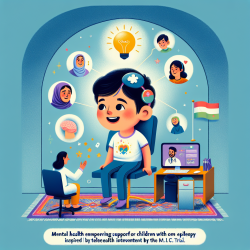Children and young people with epilepsy often face unique challenges that extend beyond managing seizures. Mental health disorders such as anxiety, depression, and disruptive behavior are prevalent in this population but remain underdiagnosed and undertreated. The M.I.C.E—Mental Health Intervention for Children with Epilepsy trial offers promising insights into addressing these challenges through a systematic approach.
The Need for Integrated Care
The M.I.C.E trial underscores the importance of integrating mental health care within epilepsy services. Traditionally, mental health and physical health services operate in silos, leading to gaps in care for children with co-occurring conditions. By embedding mental health interventions directly into epilepsy care settings, the trial aims to enhance early detection and intervention.
Understanding MATCH-ADTC
The Modular Approach to Therapy for Children with Anxiety, Depression, Trauma or Conduct Problems (MATCH-ADTC) is a key component of the M.I.C.E trial. This evidence-based psychological intervention is designed to be flexible and adaptable, allowing therapists to tailor treatment to each child's specific needs. Delivered over the telephone or online by non-mental health professionals, MATCH-ADTC makes mental health support more accessible.
Key Findings from the M.I.C.E Trial
- Clinical Effectiveness: The trial demonstrated that MATCH-ADTC plus usual care significantly improved emotional and behavioral symptoms compared to assessment-enhanced usual care alone.
- Cost-Effectiveness: Integrating MATCH-ADTC into epilepsy services proved to be cost-effective, offering a scalable solution for healthcare systems.
- Family Involvement: The inclusion of family members in therapy sessions was beneficial, highlighting the role of familial support in managing mental health disorders.
Implications for Practitioners
The findings from the M.I.C.E trial offer valuable insights for practitioners working with children who have epilepsy. By adopting a modular approach like MATCH-ADTC, practitioners can provide comprehensive care that addresses both physical and mental health needs. This integrated model not only improves patient outcomes but also enhances family engagement and satisfaction.
Encouraging Further Research
The success of the M.I.C.E trial paves the way for further research into integrated care models for children with long-term conditions. Practitioners are encouraged to explore how similar approaches could be applied to other chronic illnesses where mental health disorders are prevalent. Collaborative research efforts can lead to innovative solutions that bridge the gap between physical and mental healthcare.
To read the original research paper, please follow this link: M.I.C.E—Mental Health Intervention for Children with Epilepsy: a randomised controlled, multi-centre clinical trial evaluating the clinical and cost-effectiveness of MATCH-ADTC in addition to usual care compared to usual care alone for children and young.










